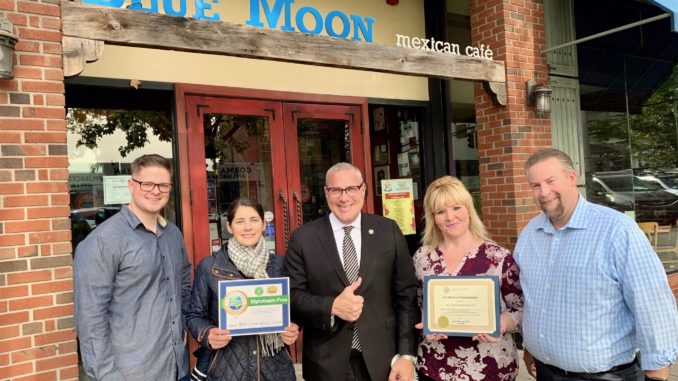
ENGLEWOOD, N.J.—The Englewood Environmental Commission will be introducing a proposal to ban expanded polystyrene food containers from restaurants, grocery stores, and school cafeterias.
Expanded polystyrene (EPS) is the term used for foam takeout containers, whereas extruded polystyrene (XPS) refers to block foam used for shipping, insulation, etc. EPS and XPS are both often called Styrofoam, but Styrofoam is a trademarked version of XPS.
Styrofoam is a plastic made from oil, mostly fossil fuel oil. Styrofoam is a public health issue because it exposes people to carcinogens particularly when used with hot foods. Further, from a waste management standpoint, it is not recyclable (in most cities) and stays in landfills for hundreds of years.
Extruded polystyrene (XPS) is more easily recyclable, and while it cannot be put in curbside recycling, Englewood DPW has a collection bin at its Recycling Center for this. The XPS is then taken to Foam Pack Industries in Springfield, N.J.
On the global scale, Styrofoam presents an even greater problem—it is made with hydrochlorofluorocarbons, or HCFC, as blowing agents that affect ozone depletion and global warming. As a greenhouse gas, HCFCs are about 1000 times more powerful than carbon dioxide.
A ban on Styrofoam is being sought by the Sustainable Jersey Bergen Hub, a group of cities in Bergen County collaborating on environmental issues. The Bergen Hub has a Styrofoam Committee which created a Styrofoam-Free program. They received funding from various entities to pay for award certificates and decals to encourage businesses to go styrofoam-free (ANJEC, Food & Water Watch, Suez, Hackensack Riverkeeper, and the Northern NJ Community Foundation.)
In Englewood, the “Styrofoam-Free Bergen County” program is overseen by Chelsea Gleis, chairwoman of the Englewood Environmental Commission, Max Walters, and Daniel Feliciano, with support from Mayor Michael Wildes.
Some Styrofoam bans are already in effect. Leonia banned foam takeout containers in 2019 and Paramus’s ordinance took effect Jan. 1. Foam containers are also banned from Bergen County property, facilities and sponsored events. Hoboken’s ban will go into effect in March.
Gleis explained, “The Englewood Environmental Commission introduced the polystyrene ordinance in March of 2019, and since then, we have been conducting outreach to businesses as part of the Bergen County ‘Styrofoam-Free Bergen County’ initiative. We have surveyed approximately 100 food-related businesses in Englewood and found that roughly half of the businesses use polystyrene containers and half do not.”
Businesses that do not are presented with Styrofoam-free award certificates and window decals.
For the businesses that do use EPS, the Environmental Commission is encouraging them to switch to other materials such as aluminum and sugarcane foam.
Many of the businesses that use EPS use it only for limited purposes. For example, one pizza shop uses it only for chicken wings, and some establishments use foam containers only for patrons to take home leftovers, not for takeout orders.
Some of the other foam-free restaurants participating in the program include Good Neighbor Juice Bar, Playa Bowls, Bennie’s, Cassie’s, Burgerim, Manhattan Bagel, Red, White & Pasta, Ben & Jerry’s, Lucky Rolls, Poke Crew, Chatkaew Thai Cuisine, Biddy O’Malley’s, and Rita’s Italian Ice.
“Once we complete our outreach, we will ask city council to take the next step in considering the ordinance,” Gleis said.
Seeking a ban on Styrofoam is one of several steps that the Englewood Environmental Commission has been taking to protect, develop and sustain the natural resources of the city under the auspices of the city council and to ensure action on the initiatives. This includes research, obtaining expert advice, and promoting citizen involvement.
In his annual Englewood State of the City Address on Jan 2, Mayor Wildes said, “I am proud of our Environmental Commission and the recognition we have received statewide, in having effectively signed onto the Paris Agreement [the agreement within the United Nations Framework Convention on Climate Change (UNFCCC), dealing with greenhouse-gas-emissions mitigation, adaptation, and finance, signed in 2016]. Sustainability is imperative to responsible development, and we owe it to our future generations to ensure that our actions work for our residents, both now and for years to come.”
